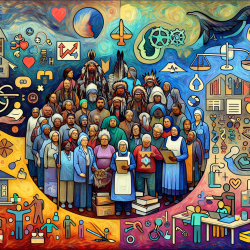The role of family caregivers in First Nations communities is both vital and challenging. Recent research titled "Three Perspectives on the Experience of Support for Family Caregivers in First Nations Communities" sheds light on the unique experiences and systemic challenges faced by these caregivers. This blog aims to provide practitioners with insights from this study to enhance their skills and encourage further research into this critical area.
The Hierarchy of Challenges
The research identifies a "Hierarchy of Challenge" that First Nations family caregivers (FCGs) face. These challenges include:
- Demanding Job: Caregiving is a demanding role with little support for the caregivers themselves.
- Difficult Navigation: Navigating healthcare and community systems is complex and often inaccessible.
- Delayed Assessments and Treatment: Delays in diagnosis and treatment are common, exacerbating health issues.
- Disconnected Health Records: Inconsistent health records create barriers to effective care coordination.
- Racism: Caregivers experience differential treatment based on race, impacting their ability to access care.
- Social Determinants of Health: Factors like poverty and inadequate housing further complicate caregiving roles.
Cultural Competence and Systemic Change
The study highlights the importance of integrating Indigenous knowledge and perspectives into healthcare practices. Practitioners are encouraged to adopt a culturally competent approach by understanding Indigenous ways of being, knowing, and understanding. This involves recognizing the value of traditional caregiving roles within Cree culture and advocating for policies that support these roles.
Practical Steps for Practitioners
Practitioners can improve their skills by implementing the following strategies:
- Advocate for Policy Change: Work towards policies that recognize and support Indigenous FCGs in healthcare systems.
- Cultural Training: Engage in experiential learning to understand diverse Indigenous cultures and histories better.
- Support Navigation Services: Advocate for navigators or team-based approaches to help FCGs access necessary services efficiently.
- Tackle Racism Head-On: Address systemic racism within healthcare settings by fostering open discussions and implementing anti-racist practices.
The Need for Further Research
The study calls attention to the lack of comprehensive research on Indigenous FCGs' experiences. Practitioners are encouraged to engage in participatory action research (PAR) methodologies that involve community members as active participants. This approach not only provides richer data but also empowers communities by valuing their input and perspectives.
Conclusion
This research underscores the need for systemic changes in how we support First Nations family caregivers. By adopting culturally competent practices, advocating for policy changes, and engaging in further research, practitioners can play a crucial role in enhancing the wellbeing of Indigenous FCGs. To read the original research paper, please follow this link: Three Perspectives on the Experience of Support for Family Caregivers in First Nations Communities.
Together, we can work towards a more equitable healthcare system that recognizes and supports the invaluable contributions of family caregivers within First Nations communities.










